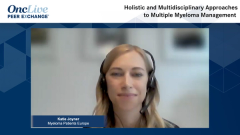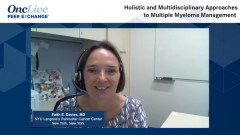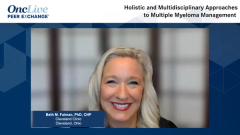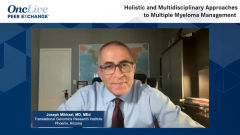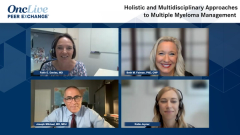
Multiple Myeloma: Challenges in Diagnosis and Role of Multidisciplinary Care
Opening its discussion on key unmet needs in multiple myeloma management, a panel of experts discuss key challenges faced when diagnosing patients with multiple myeloma and review the impact of having a multidisciplinary care team.
Episodes in this series

Transcript:
Faith E. Davies, MD: Hi there. My name is Faith Davies, and I'm a professor of medicine at NYU Grossman School of Medicine and the director for the Center for Blood Cancers at NYU Perlmutter Cancer Center, both in New York. And I'd like to welcome you to this discussion and also introduce you to my fellow panel members. So, maybe if we can start with Dr Faiman?
Beth M. Faiman, PhD, CNP: Hello, my name is Beth Faiman. I am a nurse practitioner at the Cleveland Clinic in Cleveland, Ohio, and I am also a researcher, and I am very thrilled to be here today.
Faith E. Davies, MD: Nice to see you, Beth. And Katie, please introduce yourself.
Katie Joyner: Hi. My name's Katie Joyner. I'm the cochief executive officer at Myeloma Patients Europe. Thanks so much for having me here.
Faith E. Davies, MD: Lovely. And last but not least, Dr Mikhael.
Joseph Mikhael, MD, MEd: Hey, Faith. It's wonderful to be with you. I'm sort of the thorn in the rosebush here, but it's nice to see everybody. My name is Joseph Mikhael. I am a professor at the Translational Genomics Research Institute here in Phoenix, Arizona. I also have the privilege of serving as the chief medical officer of the International Myeloma Foundation.
Faith E. Davies, MD: Great. So, today what we'd like to discuss is some of the most critical unmet needs for myeloma patients...We all recognize that the myeloma space is changing very dramatically and incredibly quickly. And so...it's important that we just take a moment to think about what some of those unmet needs are now and how we can address them and provide the best care for our patients moving forward. So...the first place we probably need to start is with some of the basics. So…Joe, what do you think are some of the current issues about diagnosing myeloma and how we should be thinking about doing that?
Joseph Mikhael, MD, MEd: Absolutely. And I'm glad that we're actually spending a fair amount of our time today talking about the diagnosis of myeloma, because when we think of that unmet need—as you mentioned, the disparity—very often it's that delayed diagnosis. The average patient sees their primary care provider 3 times with signs and symptoms consistent with myeloma before the diagnosis is invoked and the testing [is] done, that we're going to be describing shortly, to be able to confirm the diagnosis. So, patients don't come in with a sign on their head saying, hi, I have myeloma...they come in with fatigue, they come in with anemia, they come in with pain, and they may not even call it bone pain. They just come in with pain.
And so, one of the things that...is critical going forward is our relationship in the oncology community with the primary care world. [That] becomes fundamental so that we have an open pathway of thinking [and] that we facilitate the way the diagnosis is made. Very often...the primary care physician is seeing...20 [patients with] back pain that day. Why would they think about myeloma? And so, our interaction with them, making [them] aware of which individuals [are] high risk, those who are getting older, those of certain race and ethnicities—as we know, the disease is twice as common…here in the US in the African American community, for example—those kinds of things will allow us to assist our primary care colleagues [so] that…they see those things that trigger the diagnosis, as I mentioned, the fatigue, the anemia, the pain, the elevated protein...low immunoglobulins, if they're tested for renal insufficiency of unclear etiology, these sorts of things. It's important for us as an oncology community to be a resource to that group so that we can facilitate a more rapid diagnosis.
Faith E. Davies, MD: Yes, I was going to say, I'd probably just like to add a few other key groups on there…such as my renal colleagues, my orthopedic colleagues, and actually, more and more now, my interventional radiology colleagues, because they're often…seeing these patients maybe before they make it to our clinic.
Joseph Mikhael, MD, MEd: Really, it is multidisciplinary. You're right, Faith. When we look at the bigger picture, about two-thirds of patients have the diagnosis of myeloma made through a primary care provider. But you're right, the other third is a mix of so many different specialties: cardiology, nephrology, neurology, radiology, emergency room physicians, and others, as you've mentioned. And so ... it's good for us to have that bigger picture.
Faith E. Davies, MD: Because of that multidisciplinary thing…[are there] any particular challenges…that we need to…make sure everybody's aware of?
Joseph Mikhael, MD, MEd: Well, I'm more than happy to let Katie and Beth jump in in a second. What I would say is, what I try to emphasize in many of the programs that I develop for primary care physicians are…2 armed programs of thinking. What are the signs and symptoms? So, being aware of it. And in whom [is there] particularly high risk? But also, what are those initial tests that need to be done to help figure it out? And historically, people just order serum protein electrophoresis, which does capture a significant fraction of patients, but not every patient. So, ensuring that the CBC [complete blood count], the biochemistry, the serum protein electrophoresis, and the serum free light chain assay are done becomes one of the strategies that...is really important as we educate our primary care colleagues.
Faith E. Davies, MD: Excellent. Beth, is there anything you'd like to add?
Beth M. Faiman, PhD, CNP: Yes, of course. So, I would like to add that a majority of patients come to my clinic with unexplained anemia, unexplained renal insufficiency. And...as Dr Joe had mentioned, the monoclonal protein analysis of the serum and the urine is…a very important test to obtain, as well as the kappa and lambda free serum. I see still very much [that] physicians are ordering the urine kappa and lambda free light chains, which I don't think are as informative and can have some false positives. So, tests such as a CBC chemistry panel are frequently ordered by many specialists and…generalists, as well as the serum protein electrophoresis, monoclonal protein analysis, and don't forget the free light chains. Those are critical pieces. And try to rule out normal causes of anemia and normal causes of renal insufficiency. A misdiagnosis is something nobody wants to make, correct?
Faith E. Davies, MD: Yes, that's good. And, Katie, you bring…a unique perspective to this, because my suspicion is that you often talk to many patients with a late diagnosis. So, what are your…thoughts?
Katie Joyner: So, Myeloma Patients Europe conducted some research last year looking at the diagnosis challenges in Europe. We surveyed over 600 patients and also interviewed hematologists as well. And we're seeing similar challenges ... awareness of the symptoms, the nonspecificity of symptoms...need for better education and training among GPs and other related specialists, as well as awareness of the types of tests that you should be taking and the availability and accessibility of these tests. But we also got some feedback on…the need for general improvement of public health awareness initiatives. So, if you're experiencing symptoms and you feel unwell, go see your GP. And that's something that...isn't specific to myeloma but could help improve...early detection across a lot of diseases. And our survey found that about 50% of the patients who responded waited more than 3 months to seek out health care when they were experiencing symptoms like fatigue and bone pain. And there's no reason to wait that long if you're suffering. And so, we can help reduce those delays if we also just encourage people to see their doctor.
Faith E. Davies, MD: That's amazing.
Transcript is AI-generated and edited for clarity and readability.


